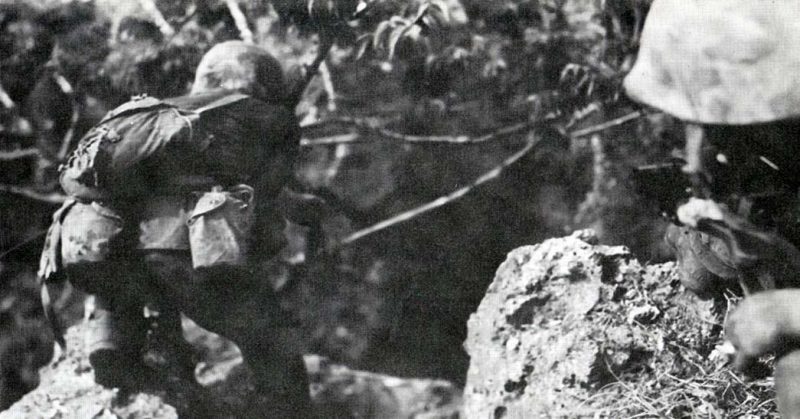A 19-year-old US Marine from Montana took a Hinomaru flag from a Japanese officer who had been killed in the Battle of Saipan. Now, Marvin Strombo, 92, is looking to return the flag to the Japanese soldier’s family.
He was on campus at the University of Montana to talk to the Japanese and Culture class about his experiences in the war. He was also hoping to get some help locating the family of the flag’s original owner. Robert Tuck, the assistant professor of Japanese at the University of Montana, was able to give some information about the flag.
Hinomaru were Japanese flags with the red sun on a white background. Around the sun, family members wrote wishes of fortune in battle. Japanese soldiers often carried these flags into battle as good luck charms. One side of the flag had the name of the soldier.
Tuck explained that the writing said “Yasue Sadao,” Yasue being the family name and Sadao being the man’s personal name. Many of the wishes on the flag were signed with the name Yasue. Tuck surmises that these are probably brothers, parents or other close relatives.
The flag also includes many wishes from people named Imai. Tuck can’t be sure, but he believes that these may be the names of people from his wife’s family or possibly a family that adopted him before the war – a common practice in Japan before WWII.
Strombo is one of three surviving sniper-scouts from the 6th Marine Regiment that was known as the “Forty Thieves” of Saipan. In June of 1944, Strombo was one of five raiders that were the first to enter Garapan, the capital of Saipan. They went behind enemy lines to gather intelligence. They needed to fight through an ambush on the way into town.
As they were leaving the town, Strombo found the dead Japanese officer. It was common for soldiers to take souvenirs from the battlefield. Japanese soldiers often took dog tags from dead American soldiers, and Strombo took the flag. The dead soldier also had a saber, which told Strombo that the man was an officer. Strombo took the saber too but lost it when his house was robbed. Strombo has considered searching for the family of the dead soldier for years. He said he never felt like the flag belonged to him.
Rex Ziak of the nonprofit organization, Obon Society, said that the desire to return spoils from WWII is a global phenomenon. He and his wife, Keiko, have been in contact with people from Canada, Ireland, Wales, Singapore and the Marshall Islands among other places. All of those people have something they took from the battlefields of WWII and now would like to return items they took over 70 years ago.
The Ziaks began in 2009. They work with scholars, researchers, attorneys, and officials in the Japanese government to return war souvenirs to the families of deceased soldiers. They work on donations and their own savings.
On Memorial Day 2016, their work was highlighted on a CBS News broadcast. The report featured the Ziaks helping Terry Stockdale return a Hinomaru flag that his father took in WWII. The Ziaks located the children of the Japanese soldier and Stockdale traveled to Osaka to present the flag to them.
Since the CBS report ran, the Ziaks have been overwhelmed with requests to help people return objects they took from slain soldiers, Missoulian reported.
What’s happening, Ziak said, is “something that should fill us with hope and joy, because you and I both know that when countries go to war, those feelings of war do not end when treaties are signed or somebody surrenders.”
What’s happening between America and Japan, he said, is “really quite remarkable.”
“Back then I don’t think there were ever two enemies that hated each other more and fought each other more savagely. They were on opposite ends,” he said. “Yet here we are 75 years later and Japan is among our most trusted allies.”
At first, the Ziaks thought that what they were doing was only helpful to the Japanese. They have since come to realize the value of their service to American veterans and their families.
